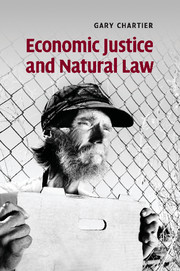3 - Foundations: work
Published online by Cambridge University Press: 18 December 2009
Summary
Natural law theory offers a positive vision of work's potential: in the workplace, people can develop as persons, hone and express their creativity, and produce goods and services that provide others with new opportunities for participation in the various aspects of well being. Work matters, though it need not devour our lives. Natural law theory also makes clear why workers deserve the respect and protection afforded by due process, and why no worker deserves to be denied employment-related opportunities because of characteristics unrelated to her actual or potential job performance. And natural law theory grounds a powerful case for participatory management and a strong case for the democratic governance of firms by workers.
In Part I, I suggest that work is important, but that natural law theory provides good reason to reject rigorist or maximizing views of responsibility in the workplace. In Part II, I argue that decisions regarding hiring, promotion, reassignment, and termination must be made in ways that afford workers with due process. Failing to provide due process is unfair and often inefficient, violates personal dignity, and ignores the significance of people's needs for stable identities and relationships. In Part III, I maintain that fairness requires nondiscriminatory work practices. I argue in Part IV for the view that the workplace ought to be participatory, that each worker should have a voice at work.
- Type
- Chapter
- Information
- Economic Justice and Natural Law , pp. 69 - 122Publisher: Cambridge University PressPrint publication year: 2009



